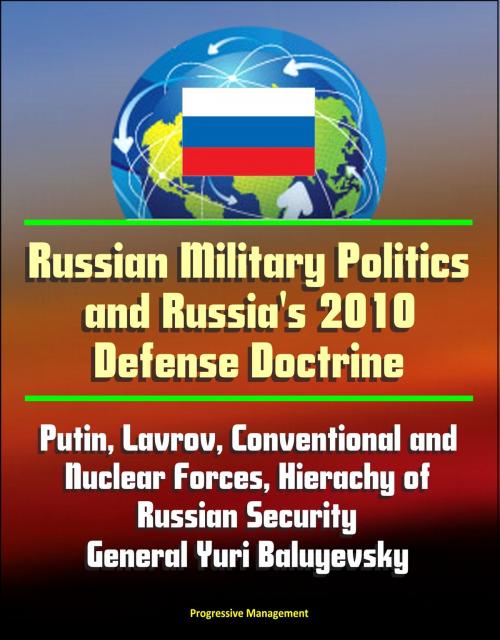Russian Military Politics and Russia's 2010 Defense Doctrine: Putin, Lavrov, Conventional and Nuclear Forces, Hierachy of Russian Security, General Yuri Baluyevsky
Nonfiction, History, Military, Strategy, Asian, Russia| Author: | Progressive Management | ISBN: | 9781310193057 |
| Publisher: | Progressive Management | Publication: | March 15, 2014 |
| Imprint: | Smashwords Edition | Language: | English |
| Author: | Progressive Management |
| ISBN: | 9781310193057 |
| Publisher: | Progressive Management |
| Publication: | March 15, 2014 |
| Imprint: | Smashwords Edition |
| Language: | English |
This monograph is devoted to a consideration of Russia's military doctrine. Russia had long before the conference announced the impending release of a new defense or military doctrine, but its release date was always being delayed, signifying a sharp political struggle over its contents. Although the doctrine ultimately was released on February 5, 2010, after the conference, the papers were nonetheless able to some degree to use the new text in their analysis. As a result, these three chapters provide an extremely revealing examination of the struggles over defining the threats facing Russia and the responses that the government should take to meet them. These struggles, as delineated here, provide deep insight into the nature of Russian security and military politics and the evolving views of key military and governmental institutions. No understanding of contemporary Russian defense and overall security policy is truly complete without taking into account the "backstage" politics described here. Neither is the doctrine entirely comprehensible without the kind of analysis that is offered. For these reasons we offer this monograph to our readers so that they can benefit from the expert insights of the authors.
It consists of three deeply probing essays into the genesis of the doctrine, the political struggle behind it, and the actual content of the doctrine. They reveal a highly politicized minefield of struggle comprising leading actors in the Russian military, government, and security policy circles as a whole. They duly illuminate the ongoing struggles between and among these sets of military and civilian elites and therefore cast a shining light on critical aspects of Russian policy that all too often are left in the darkness.
In this context, it is fair to say that it would be impossible to grasp fully the nature and direction of current Russian security policies without such an examination of the struggle to formulate it and present it to the public. The question of what direction Russian policy is following is of the utmost importance, given Russia's importance in world politics and the new Russian policy of the Obama administration. Therefore, the clarification of otherwise murky and obscure trends that are of great significance to the United States will be of great value to our readers and audience.
In assessing Russia's security policy, the analysis of military doctrine plays an important role. Military doctrine forms a part of the national security policy and is a reflection of past and possibly future political-military policy. Therefore, to gain a good insight into Russian security policy, a thorough analysis of the development of Russian military doctrine is essential.
This monograph is devoted to a consideration of Russia's military doctrine. Russia had long before the conference announced the impending release of a new defense or military doctrine, but its release date was always being delayed, signifying a sharp political struggle over its contents. Although the doctrine ultimately was released on February 5, 2010, after the conference, the papers were nonetheless able to some degree to use the new text in their analysis. As a result, these three chapters provide an extremely revealing examination of the struggles over defining the threats facing Russia and the responses that the government should take to meet them. These struggles, as delineated here, provide deep insight into the nature of Russian security and military politics and the evolving views of key military and governmental institutions. No understanding of contemporary Russian defense and overall security policy is truly complete without taking into account the "backstage" politics described here. Neither is the doctrine entirely comprehensible without the kind of analysis that is offered. For these reasons we offer this monograph to our readers so that they can benefit from the expert insights of the authors.
It consists of three deeply probing essays into the genesis of the doctrine, the political struggle behind it, and the actual content of the doctrine. They reveal a highly politicized minefield of struggle comprising leading actors in the Russian military, government, and security policy circles as a whole. They duly illuminate the ongoing struggles between and among these sets of military and civilian elites and therefore cast a shining light on critical aspects of Russian policy that all too often are left in the darkness.
In this context, it is fair to say that it would be impossible to grasp fully the nature and direction of current Russian security policies without such an examination of the struggle to formulate it and present it to the public. The question of what direction Russian policy is following is of the utmost importance, given Russia's importance in world politics and the new Russian policy of the Obama administration. Therefore, the clarification of otherwise murky and obscure trends that are of great significance to the United States will be of great value to our readers and audience.
In assessing Russia's security policy, the analysis of military doctrine plays an important role. Military doctrine forms a part of the national security policy and is a reflection of past and possibly future political-military policy. Therefore, to gain a good insight into Russian security policy, a thorough analysis of the development of Russian military doctrine is essential.















